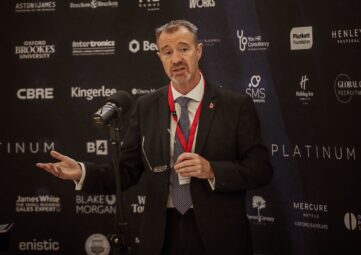
Oxford Brookes University awarded a £1.4M grant to develop tools to answer fundamental genetics questions
A new £1.4M grant will fund a five-year research project by scientists at Oxford Brookes University. Funded by the Biotechnology and Biological Sciences Research Council (BBSRC), the grant will also create three new roles, and new opportunities for PhD students.
Dr. Korneel Hens, senior research fellow at the Oxford Brookes Centre for Functional Genomics said: “I’m really excited to start this new project. This grant allows us to invest in the technical facilities we need and funds us for enough time to allow us to push forward our work to build new investigative tools and techniques that we can make available to researchers around the world. We hope they will use them to increase our understanding of how organisms are made, how they function and how we can intervene to treat diseases when normal function is disrupted.” Dr Hens and his colleague Dr Sebastian Kittleman will be collaborating with Dr Jack Sunter at the the Oxford Brookes Centre for Bioimaging.
The research into functional genomics looks at how genetic material that is the same in every cell in a living organism can give rise to the wide variety of shapes and functions of individual cells. For example, a liver cell contains the same genome as a heart cell but they look very different and do very different things. This is achieved by activating different sets of genes within the genome at different times during development.
Genes contain DNA sequences that contain a code for how molecular building blocks create specific proteins. This code is very well understood and given a protein-coding DNA sequence, a scientist can very accurately predict which protein will be made. Genes also contain the information on when, and in which cells, to become active. This regulatory code is much less well understood, and given a regulatory DNA sequence, a scientist would not be able to accurately predict when and where the gene will become active. An important family of proteins that help regulate the activity of our genes are the transcription factors. They bind the regulatory DNA and activate or inactivate genes. The Oxford Brookes team aims to provide a toolkit for the research community to study the interactions between these transcription factors and the regulatory DNA.
This research will have massive implications for our basic understanding of gene regulation and will underpin research into disease progression and treatment. For example, knowing which transcription factors are important to produce a particular cell type is instrumental in the development of cell replacement therapies. This might include diseases like diabetes where people suffer symptoms when insulin producing pancreatic cells die, or neurodegenerative diseases like Parkinson’s where stimulating growth of new cells might slow or reverse disease progression.
Dr Hens added: “It’s a bit like lego – you can have a big container of different bits of lego in all shapes and sizes but you need the instruction manual to tell you how to build a car. The more complicated the car is that you are building, the thicker the instruction manual will be. We’re working out what those instruction manuals contain. We’re working with CRISPR technology that will put a fluorescent tag on all transcription factors in fruit flies. This allows us to look at their tissue distribution which we can examine under the microscope as well as to perform many other biochemical assessments. The underlying mechanisms of genetic regulation are the same in a fly or a mouse or a human so our work can be used in much wider research.”
More in Finance

How B4 members could benefit from Salary Exchange before National Insurance...
Sarah Herd, Head of Workplace, Wren Sterling

UK Bond Market: What You Need to Know
The UK government bond market is once again making headlines as yields on longer-term debt surge to levels not seen in decades. This latest development has raised concerns among investors and policymakers, presenting significant challenges for the government’s fiscal plans.

B4 Finance Ecosystem: The specific opportunities and challenges that women encounter...
Charles Stanley are committed to fostering a proactive approach to investing and their goal is to empower women to make well-informed financial decisions and capitalise on potential growth opportunities. They also strive to support women in crafting their unique financial narratives, enhancing their knowledge, and understanding of investment strategies, and building a robust and influential female network.
From this author

Olympics 2024: Getting the balance right in sports nutrition
As the countdown to the Olympics gets underway, the focus for athletes is on getting fitter, faster, and stronger, but at what cost? Qualified sports nutritionist Clare Shaw, a Senior Sports Lecturer at Oxford Brookes University, and a practitioner on the Sport and Exercise Nutrition register (SENr), is researching the impact of low energy availability in athletes for her PhD. Here she discusses her research and offers tips for balancing energy intake and output.

Oxford Brookes University to showcase cutting-edge AI research at free week-long...
Oxford Brookes University will be showcasing the most recent developments and breakthroughs in artificial intelligence research at its annual Festival of AI this week. The festival runs from today until 7 June and includes a series of free workshops that will explore how AI can revolutionise schools, business and society.

Local business leaders in Oxfordshire tell Chancellor: Keep graduate visa route...
Oxfordshire Local Enterprise Partnership (OxLEP) has joined university and business leaders to warn the government against watering down or scrapping the graduate visa route.


